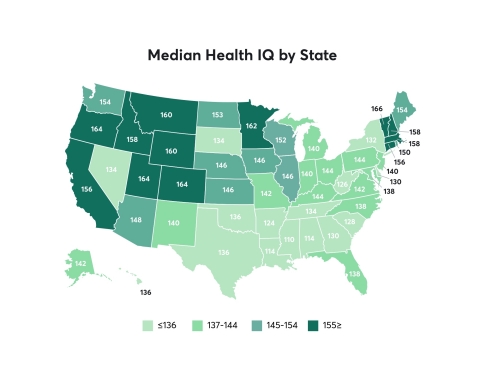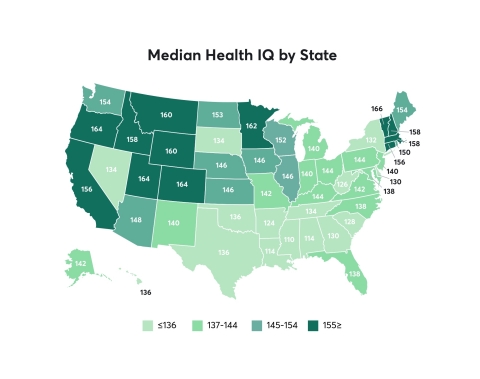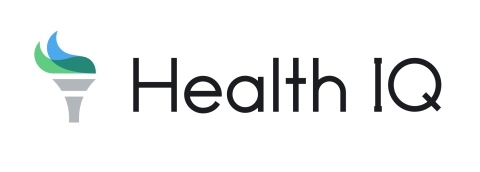MOUNTAIN VIEW, Calif.--(BUSINESS WIRE)--Health IQ, the nation’s fastest growing life insurance company, today released a report entitled, “Health Literacy in the 50 States.” The report uses Health IQ’s research and data compiled from more than 10 million “Health IQ” quizzes to highlight the connection between health literacy, chronic diseases and health care costs.
“In the last three centuries we dramatically improved reading literacy in the U.S. and around the world and transformed society. In this century, improving health literacy can have the same effect. The first step is to assess where we are as a country. Our calibrated Health IQ test is the first large-scale attempt to do this,” said Munjal Shah, CEO of Health IQ.
The report found that the average health literacy score for any state is 143.4 out of 200. At Health IQ, we define the health literacy threshold as a score of 184. Only 17 percent of quiz takers reached that score, which means health literacy today is where global reading literacy was in the 1850s.
“Our report shows that even small improvements can make a difference in health outcomes. States with 10 to 20 percent higher health literacy scores had 4 to 14 percent lower rates of diabetes, obesity and high blood pressure. Our report also showed a strong correlation between health literacy and health care costs, which are a serious challenge for individuals, families and society as a whole. We hope this report provides consumers, providers and policymakers valuable insights as they strive to improve the health of individuals and communities,” Shah added.
Key findings:
- Five Highest Health IQ States: Vermont, Colorado, Oregon, Utah, Minnesota
- Five Lowest Health IQ States: Mississippi, Alabama, Louisiana, West Virginia, South Carolina
- Health IQ and Diabetes: The report shows a relationship between high Health IQ and lower rates of diabetes, a disease that is on track to cost more than $622 billion a year by 2030 if nothing is done. The five states with the highest rates of diabetes – MS, AL, LA, WV, SC – are also the states with the lowest Health IQ.
- Health IQ and Obesity: The report shows a relationship between high Health IQ and lower rates of obesity, a condition estimated to cost more than $342.2 billion annually. The five lowest Health IQ states – MS, LA, AL, AR, WV – are in the top seven states by obesity.
- Health IQ and High Blood Pressure: The report shows a relationship between high Health IQ and lower rates of high blood pressure, a major risk factor for heart disease. Four of the five top-ranked Health IQ states – UT, CO, MT and MN – are in the top five states with lowest rates of high blood pressure.
- Health IQ and Medicare Rx Costs: The report shows a relationship between low Health IQ scores and higher Medicare Rx costs, a major factor in skyrocketing Medicare costs. States with low health literacy spend up to $1,300 more on Medicare Rx costs (per capita 65+) than states with high health literacy.
-
Health IQ and Income: The report shows that while average zip
code income and median Health IQ scores tend to be related, there are
notable exceptions:
High Health IQ but relatively low income levels
Abita Springs, LA (183)
Denton, TX (182)
Athens, OH (180)
Oakland, CA (180)
Cincinnati, OH (178)
Athens, GA (176)
Low Health IQ scores but relatively high income levels
South Amboy, NJ (56)
Haslet, TX (56)
Somerset, MA (87)
Hanover Park, IL (87)
Orange, TX (102)
Hahnville, LA (104)
Methodology
Health IQ launched its Health Literacy Quiz and daily health quiz app in 2014. With more than 10.2 million Health IQ Quizzes taken in the United States, our research supports the conclusion that a high Health IQ score is correlated to lower rates of diabetes, obesity and high blood pressure.
Health IQ started out by writing 30,000 questions covering health concepts including nutrition, exercise, metabolism, disease, digestion and more. The company then assembled a team of the nation’s leading medical, health and fitness experts to review questions for accuracy. The 30,000 questions were then calibrated using a pool of over a hundred thousand people to determine the 3,000 questions that had the greatest power to predict number of self reported hospitalizations. After the quiz is finished a scaled score on a 0-200 point range is calculated and presented to the quiz taker.
To arrive at the health and fiscal conclusions in the report, Health IQ analyzed its quiz data against published reports from both the public and private sector on rates of diabetes, high blood pressure, Medicare prescription costs, and more.
About Health IQ
Health IQ is an insurance company on a mission to improve the world’s health by rewarding runners, cyclists, weightlifters, swimmers, yogis, well-managed diabetics, and other Americans living a healthy lifestyle. Health IQ gives these individuals credit for their healthy lifestyle through lower rates. Since pioneering the use of science and data to measure the impact of healthy lifestyles, Health IQ has become the fastest growing life insurance company in the nation. Health IQ has grown from zero to $16 billion in coverage in the last three years.
The company was founded for the health conscious by the health conscious. The company’s three founders were each touched by a personal health challenge and overcame them by adopting a healthier lifestyle. The founders wanted to inspire and encourage others to embrace a healthy lifestyle by giving them financial rewards.




